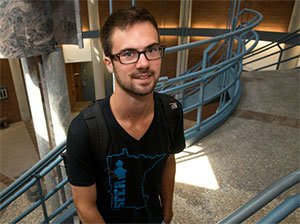Student spends time in India working on 'the civil rights issue of our generation'

College students can play a vital role in education policy debate, says U student
Adam Iversen graduated in spring 2013 with a degree in geoengineering and a minor in sustainability. He spent the summer working with artisans in India. As a student he was very involved with the student group Students for Education Reform.
Q&A with Adam Iversen
What was your project this summer in India?
I had the opportunity to spend time in India through a grant from the Acara Institute at the U. We spent six weeks meeting with artisans [in Orissa, one of the poorest states in India] and learning their stories. These artisans create incredible and unique items, but they often lack the ability to even leave their village to showcase and sell their products. In response, we launched Pragati Handicrafts, a fair trade website to connect the artisans to a broader global market.
What's the history of Students for Education Reform?
SFER was founded in fall 2010 by, quite simply, a group of students who were interested in education reform. The first chapter was started in Princeton the previous year, and we were the sixth chapter and first non-Ivy League group. There are over 140 chapters nationally and a dozen in Minnesota alone!
The goal of SFER?
To bring the students' voice to the discussion that dictates education policy. As the most recent benefactors of the K-12 system, college students have a unique voice and fresh perspective that needs to be heard. We seek to bring awareness to the achievement gap—the discrepancy in performance across racial lines and income levels—and advocate for policies that will help close it.
Why is education policy important?
Education is the civil rights issue of our generation. Across the nation, students of color and students in poverty perform drastically worse than their white, middle-class counterparts. This "achievement gap" is not an ability gap but rather an opportunity gap. Bringing equality to the education system will break the cycle of poverty seen in urban hubs and forgotten rural districts.
What's your most satisfying SFER moment so far?
It was during a debate we hosted for the Minneapolis Public Schools (MPS) School Board candidates. After the debate, several candidates stated that our probing questions challenged them on the real issues in education more so than any of their previous debates, which were put on by much larger, well-known organizations.
What's one challenge you've faced in this work?
During an MPS School Board meeting a public school teacher handed me an article she had written for a local publication. She was pretty vocal in her opposition to progressive reform and treated us like misguided, impressionable youth. One of the most intriguing aspects of education reform, in my opinion, is that it's way too complicated to paint it black-and-white. … The bottom line is that the education system is disenfranchising millions of students in this country every year. Whether you call it "reform" or not, something desperately needs to be done, and it is going to take ideas from both "sides" to make it happen.
What's your career goal?
I would love to put my engineering degree to good work in the developing world. Anything that would allow me to travel a bunch and make a difference here and there!
Why did you choose the University of Minnesota?
I transferred from a small, private university my sophomore year and was blown away by the opportunities at the U. I was able to major in my niche engineering interest, minor in an emerging area of study that I'm fascinated by, study abroad in an incredible new country, participate in a club sport and fly with a team to a national event, start a student group when I saw an interest and a need, turn a school project into a business in India, and feel part of a bright and enthusiastic student community!
What are you most curious about?
Anything related to climate change and how society will deal with such a pressing issue. Climate change discourse blends politics, science, religion, globalization, and basically everything into one unifying and somewhat frightening production.
